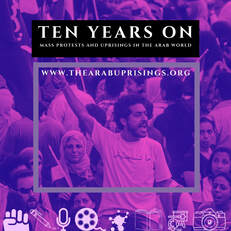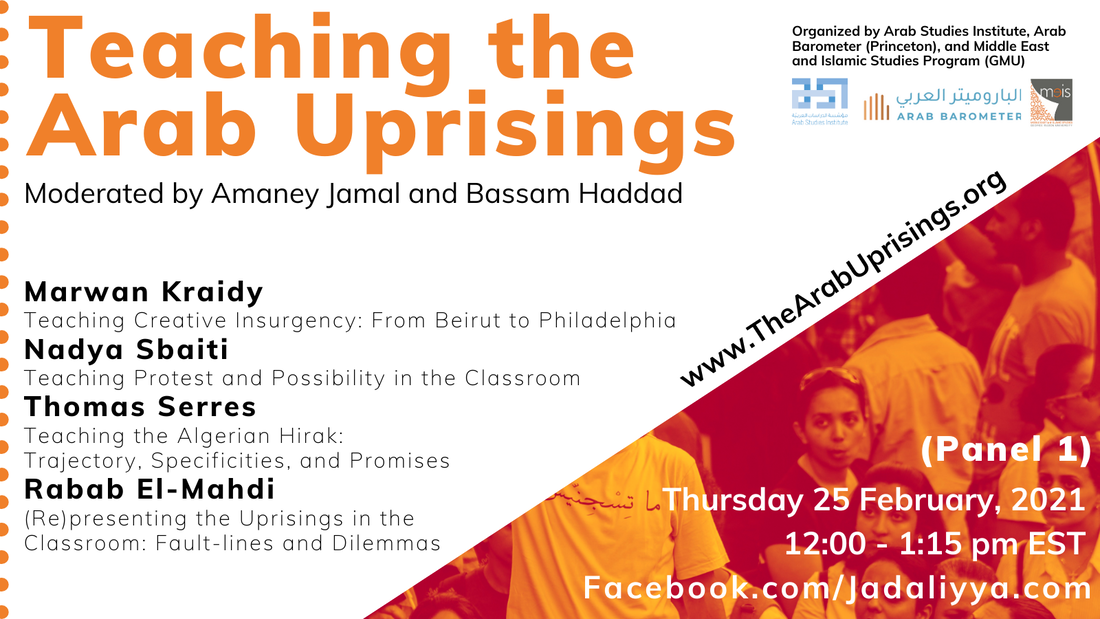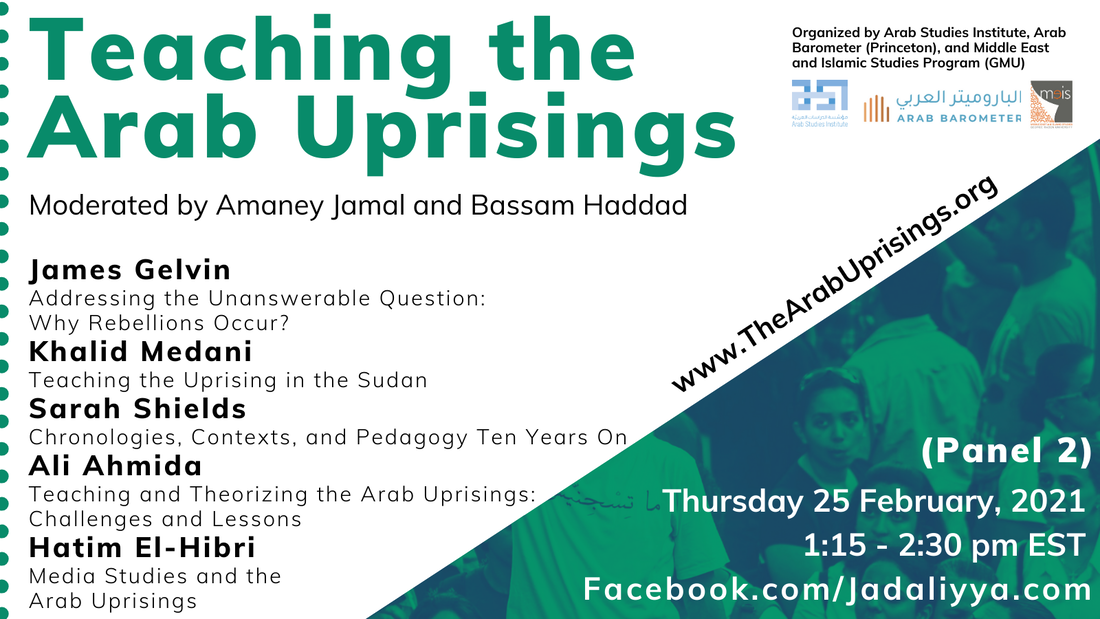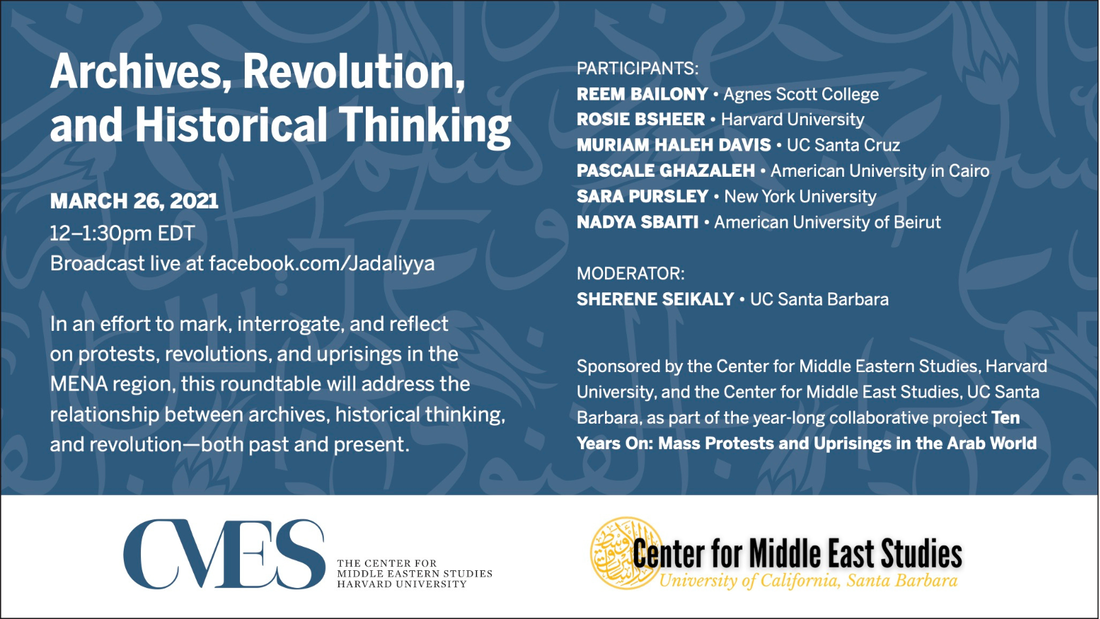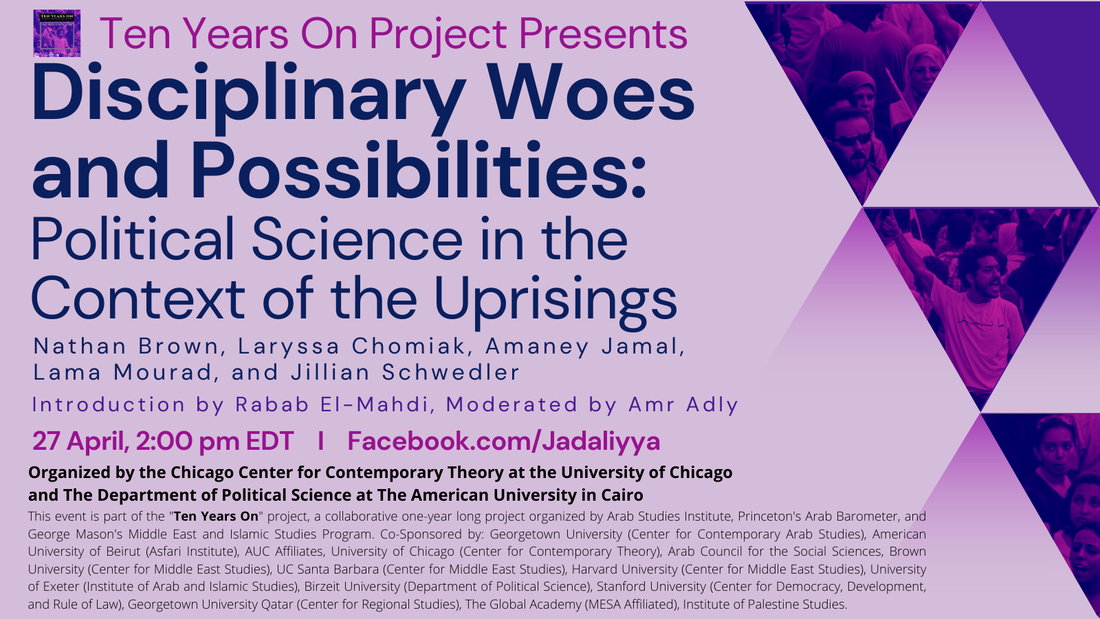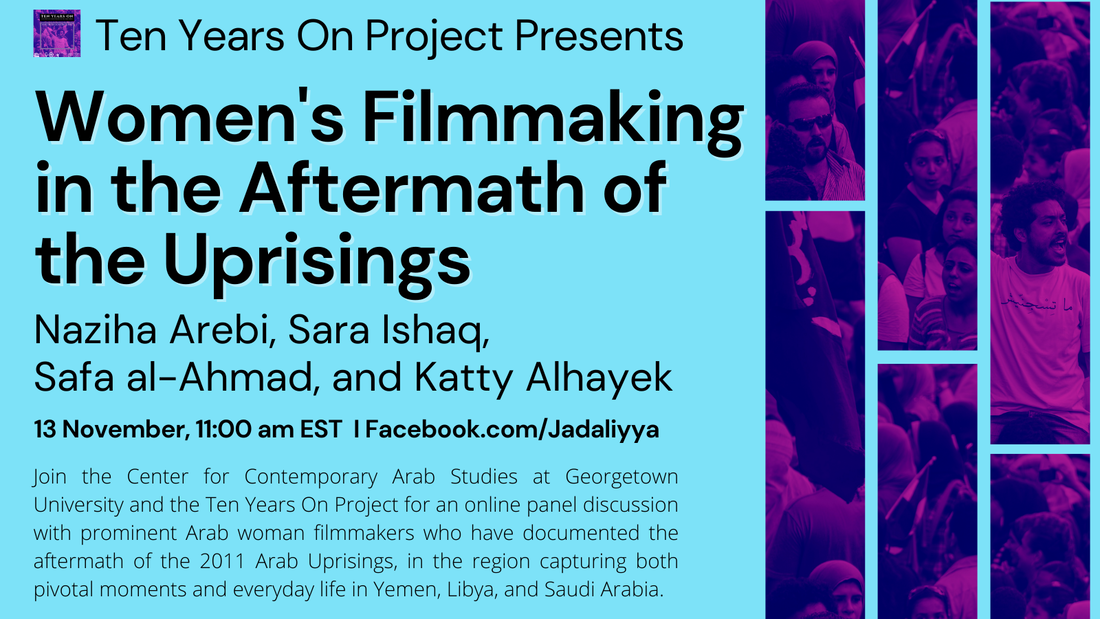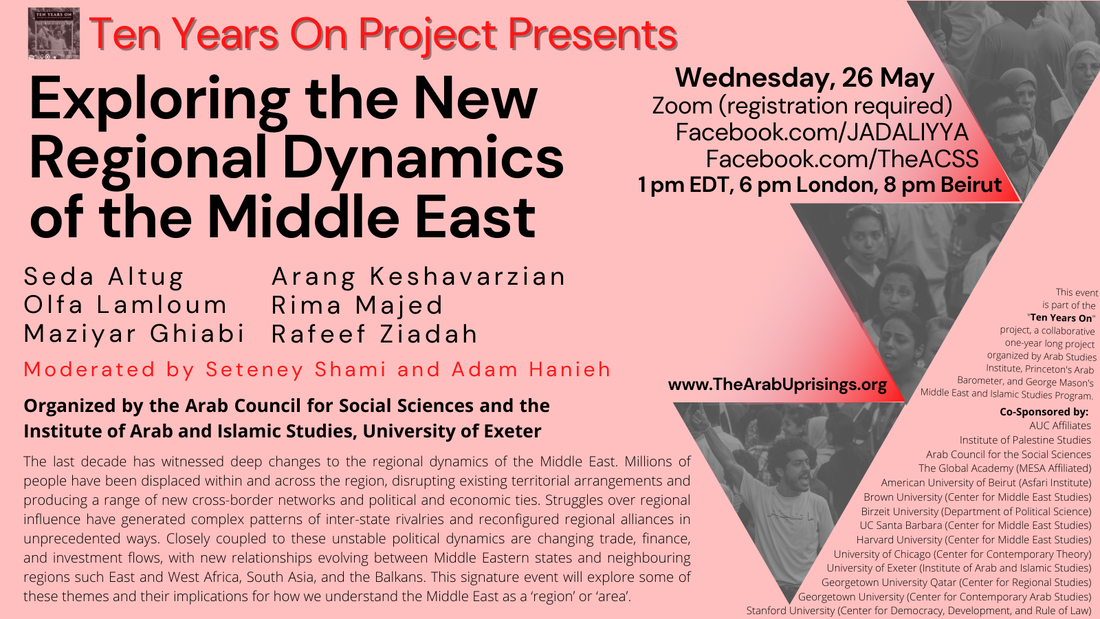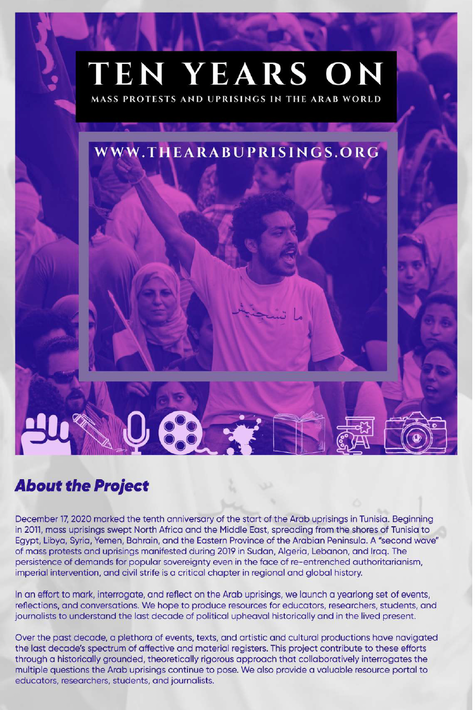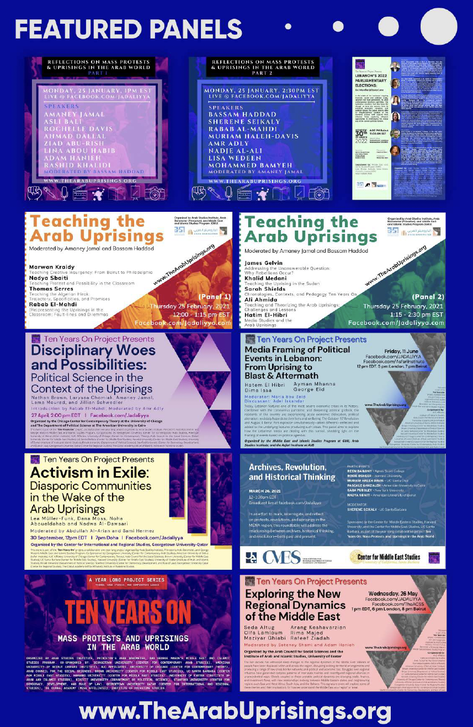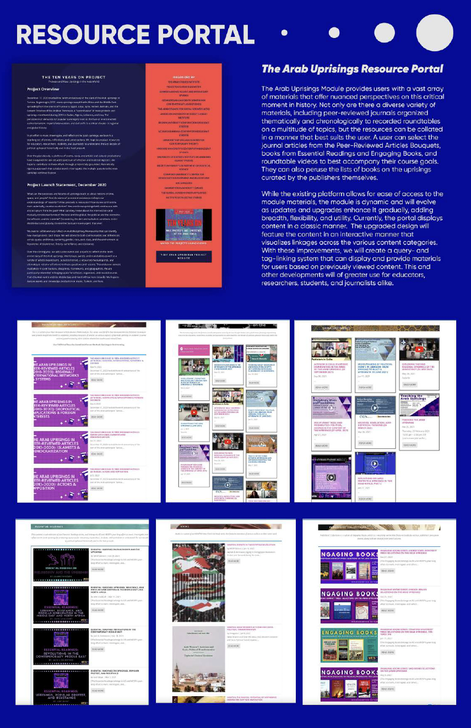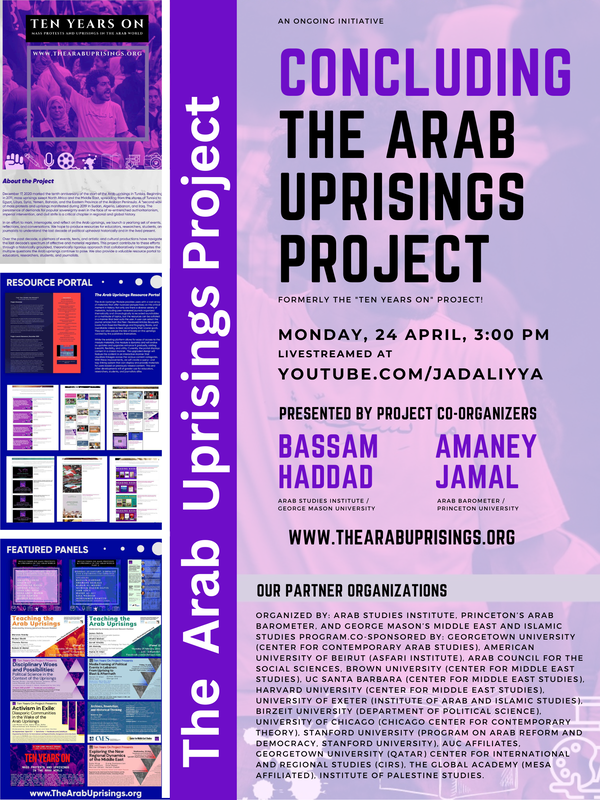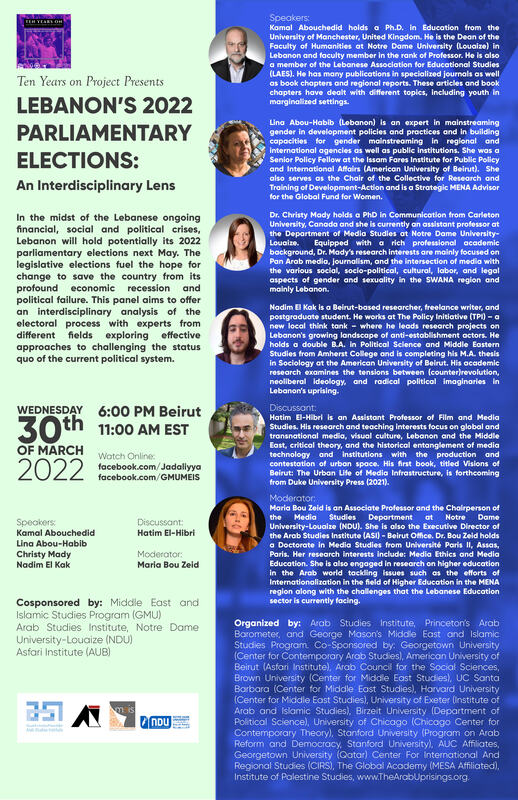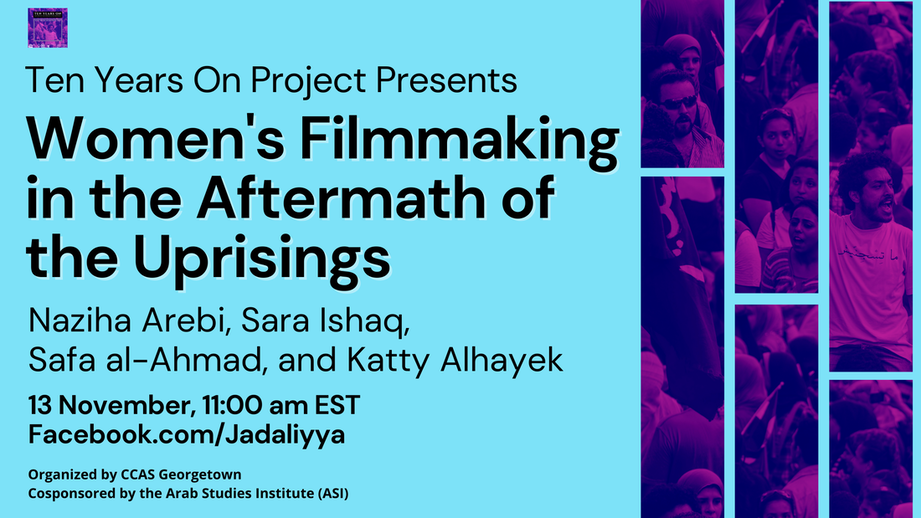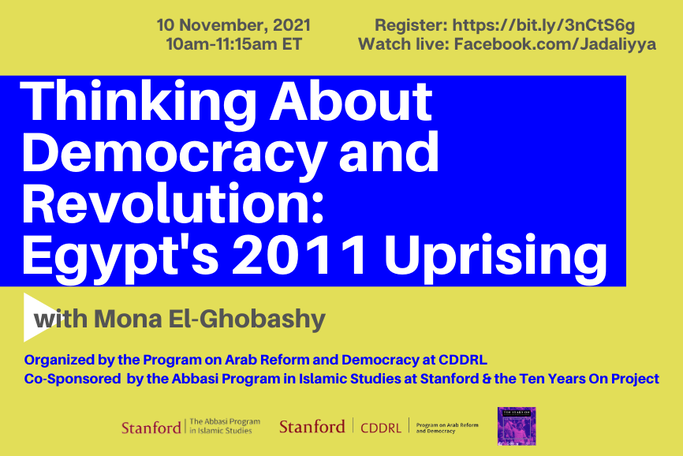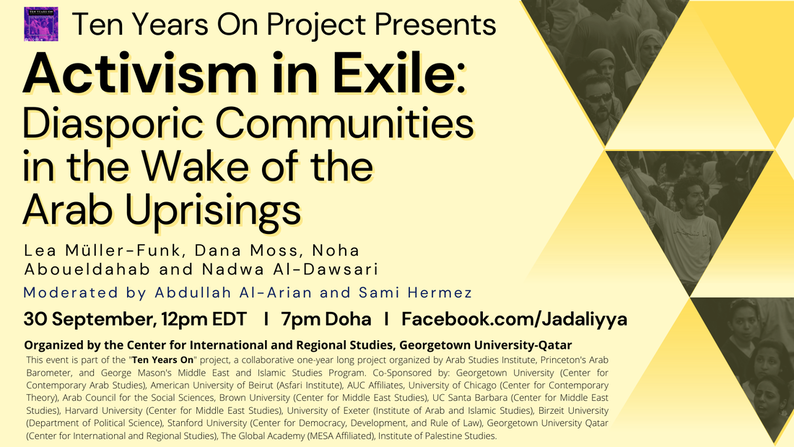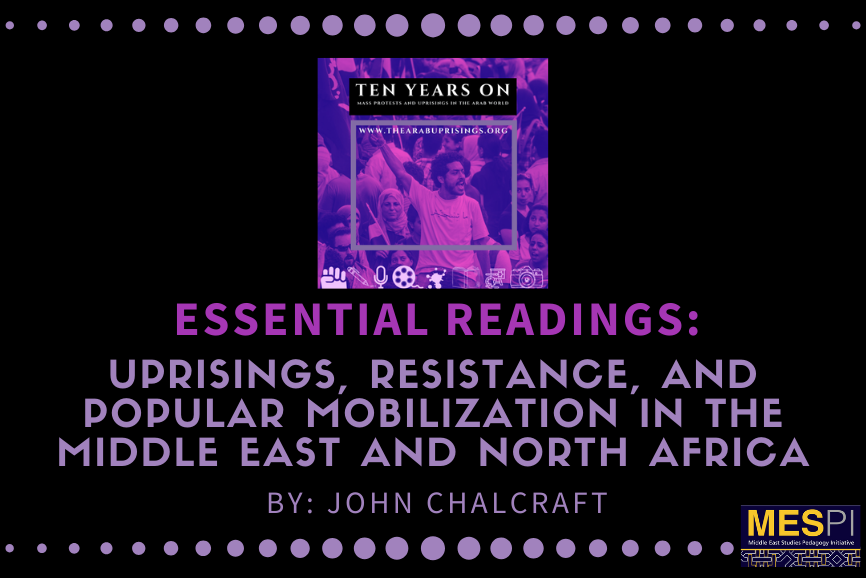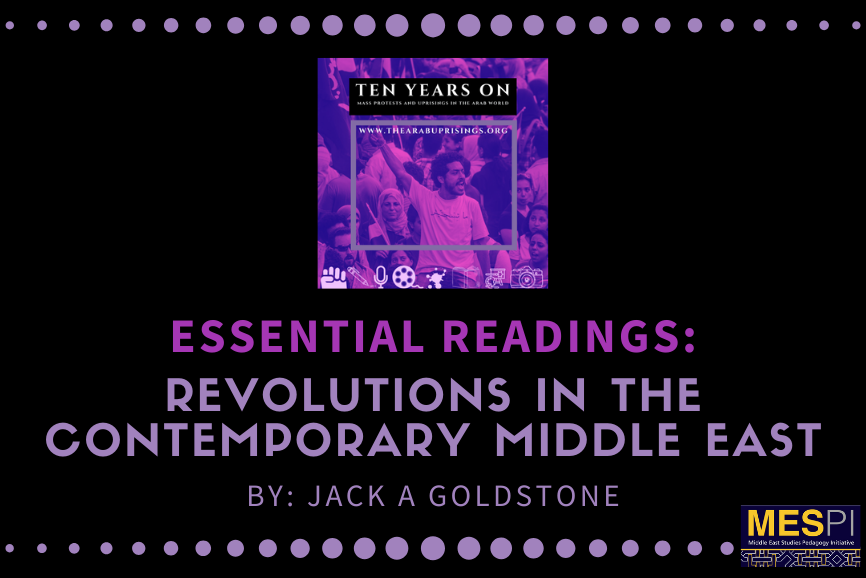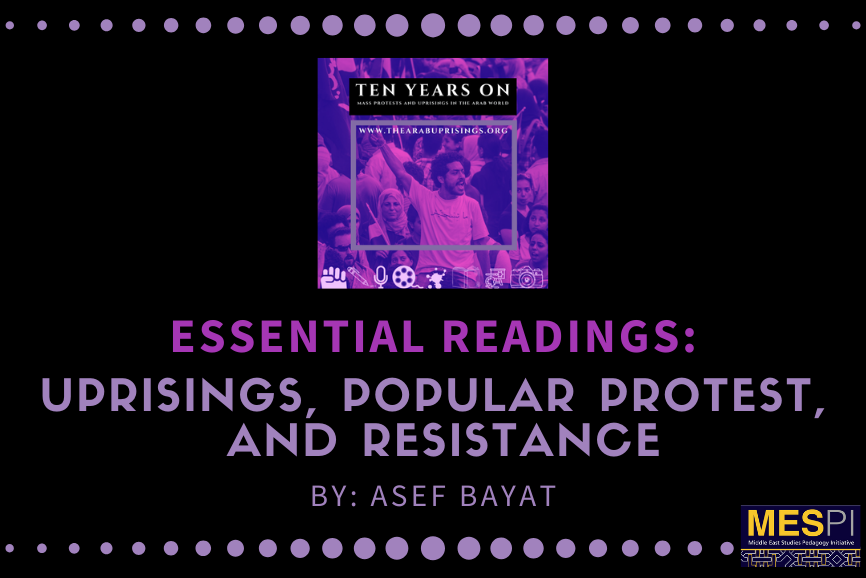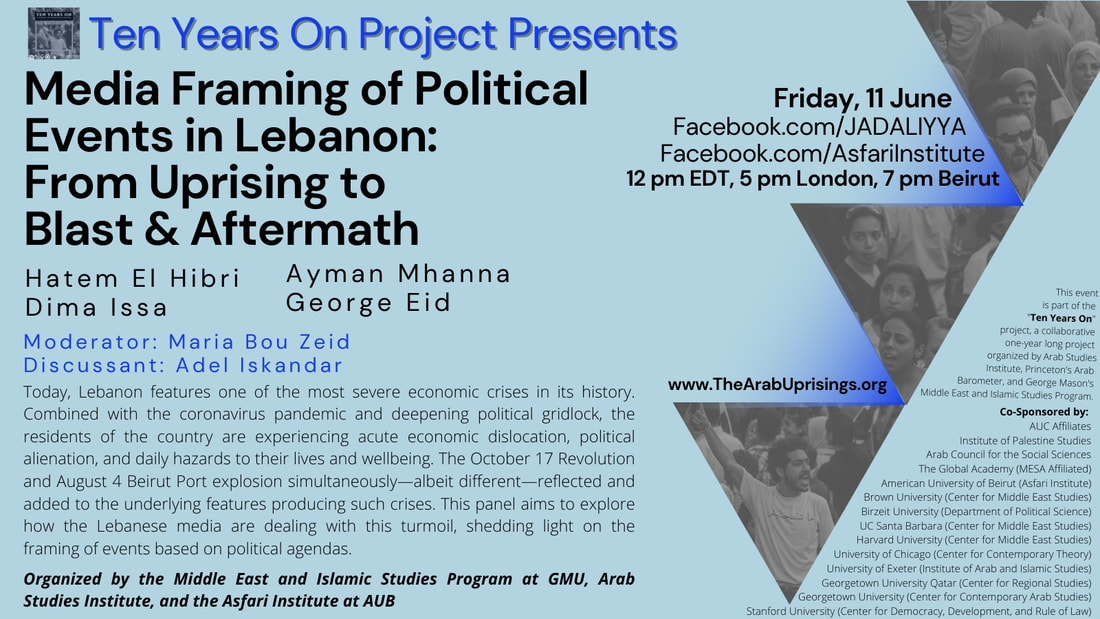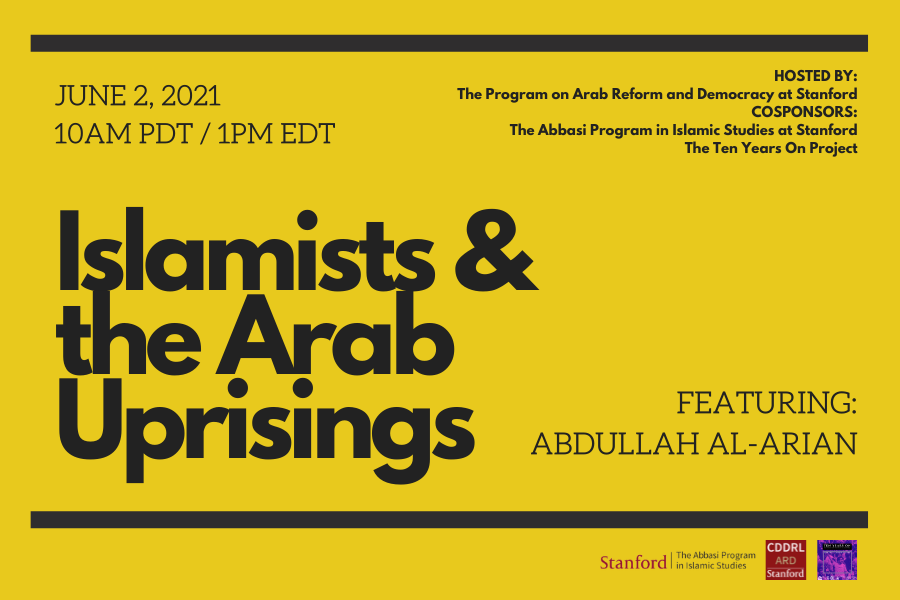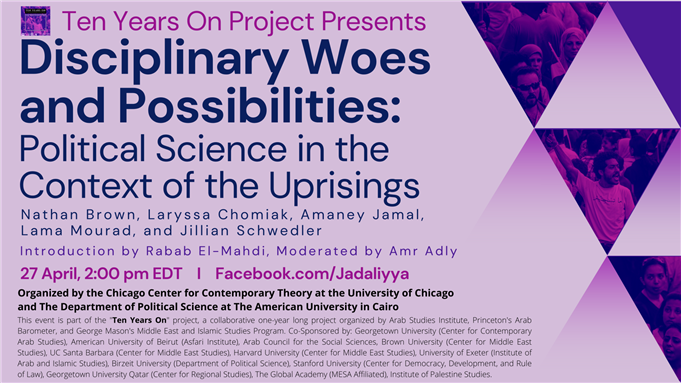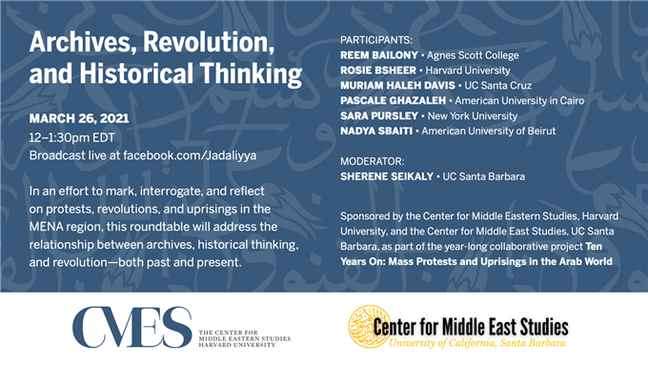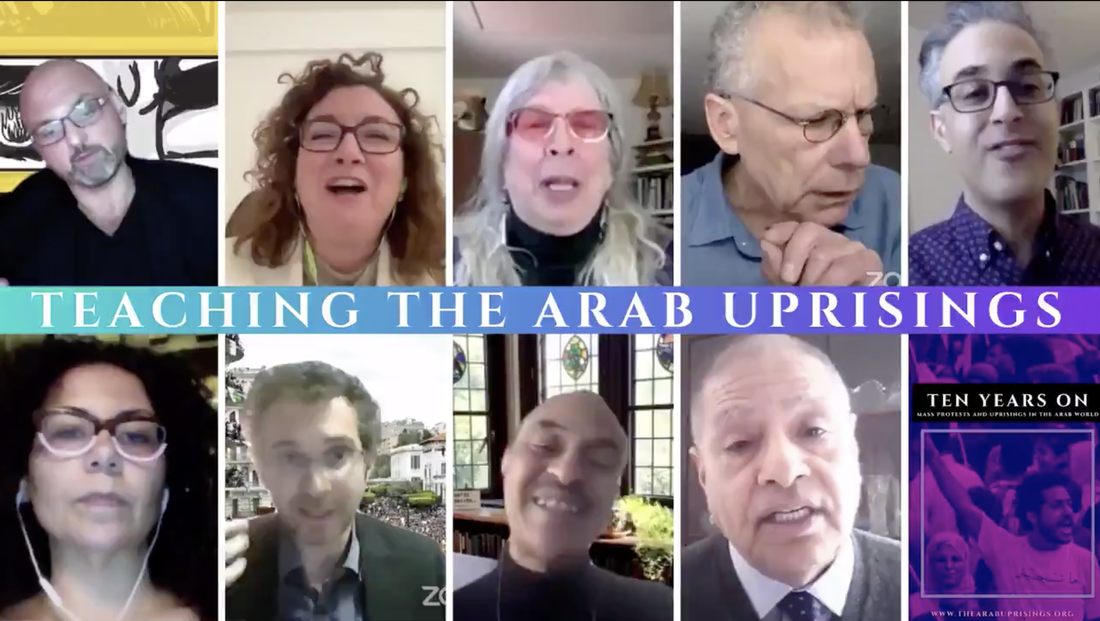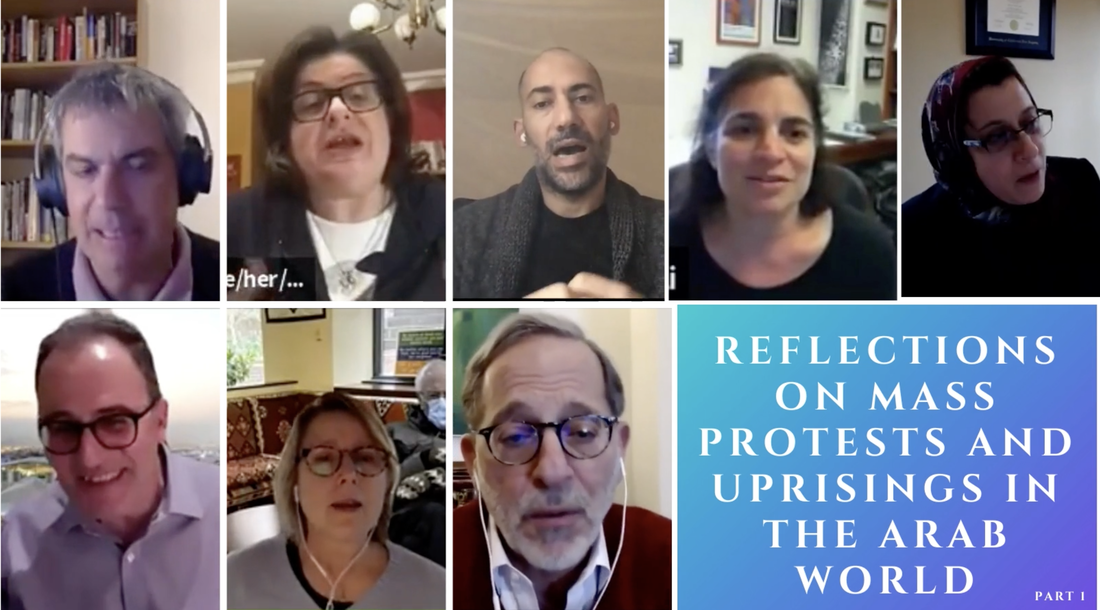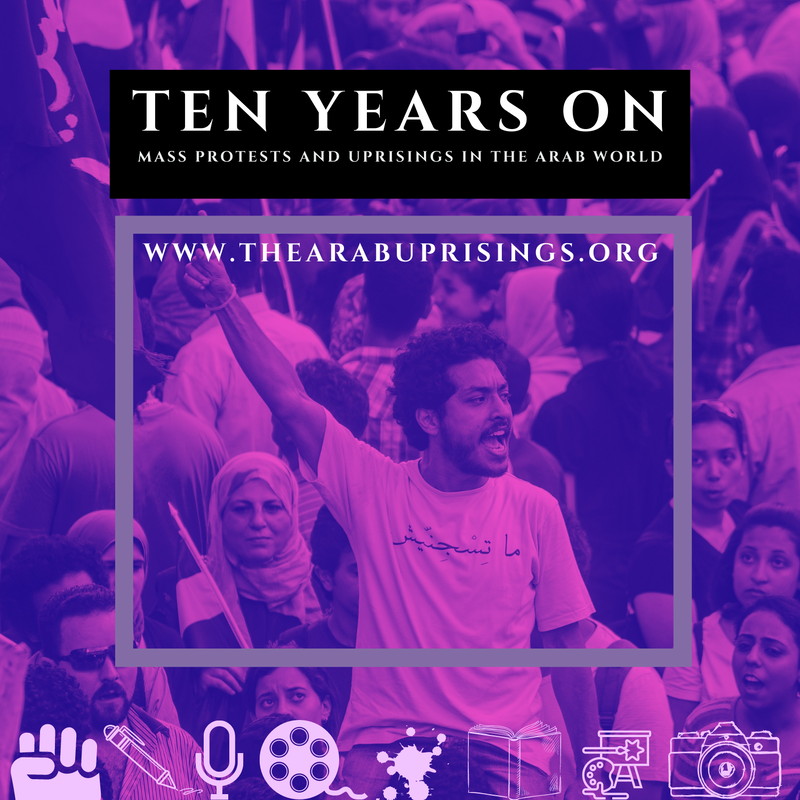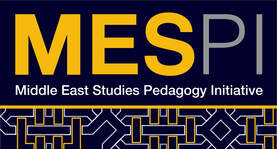STAY IN THE LOOP - SIGN UP TO RECEIVE UPDATES:
Concluding Event:
Concluding The Arab Uprisings Project with Bassam Haddad and Amaney Jamal (24 April 2023)
Recent Content:
Lebanon’s 2022 Parliamentary Elections: An Interdisciplinary Lens (30 March 2022)
In the midst of the Lebanese ongoing financial, social and political crises, Lebanon will hold potentially its 2022 parliamentary elections next May. The legislative elections fuel the hope for change to save the country from its profound economic recession and political failure. This panel aims to offer an interdisciplinary analysis of the electoral process with experts from different fields exploring effective approaches to challenging the status quo of the current political system.
Full details here.
Full details here.
Watch: Women's Filmmaking in the Aftermath of the Uprisings (13 November 2021)
Join the Center for Contemporary Arab Studies at Georgetown University and the Ten Years On Project for an online panel discussion with prominent Arab women filmmakers who have documented the aftermath of the 2011 Arab Uprisings, in the region capturing both pivotal moments and everyday life in Yemen, Libya, and Saudi Arabia.
Full details here.
Full details here.
Watch: Thinking about Democracy and Revolution: Egypt’s 2011 Uprising with Mona El-Ghobashy (10 November 2021)
Egypt’s 2011 uprising is widely held to be a case of either failed democratic transition or inauthentic revolution. Scholars of democratic transitions blame Egypt’s bickering civilian politicians for failing to do the hard work of negotiated compromise to build an inclusive democracy. Scholars of revolution doubt that Egypt’s uprising counts as a revolution, since military generals did not cede the reins after Hosni Mubarak’s fall, and ultimately reconquered the state with their July 2013 coup. But what if instead of viewing Egypt as a uniform failure, we mine it for ideas on how to refresh our concepts of democracy and revolution? In this talk, based on her new book Bread and Freedom, Egypt’s Revolutionary Situation, Mona El-Ghobashy presents an interpretation of Egypt’s 2011 uprising that brings out some lost connections between democracy and revolution.
Full details here.
Full details here.
Watch: Displacement, Disruption and Scholarly Production in the Aftermath of Uprisings (3 November 2021)
Ten years on from the uprisings in the Arab world—and with similar anniversaries in Iran and Turkey just past or upcoming—the specific effects of the displacements triggered in the aftermath of these events remain understudied. For example, in much of the region counter-revolutionary forces have targeted universities and scholars, clamping down on academic freedoms, criminalizing forms of research and study, and even reframing whole disciplines around national security priorities. Among the many impacts of authoritarian retrenchment has been a significant brain drain from parts of the region. How have these post-uprising displacements affected cultural production and knowledge production within and about the region? This panel will explore the disruptions to research and the circulation of ideas in and about the region as well as some of the generative possibilities and new networks that have been produced as a consequence of the many different forms of displacement that have affected scholars, students, activists, intellectuals and artists in the aftermath of uprisings.
Click for more details.
Click for more details.
Watch: Activism in Exile (30 September 2021)
The Arab uprisings, which saw the mobilization of millions of citizens across the Middle East and North Africa, produced new exiled communities at a massive scale. Refugees made their way to countries all over the world, escaping economic pressures, political repression and state violence. This panel of scholars, activists, and practitioners seeks to explore the demography of these recent diasporas, their forms of community organization, and modes of political mobilization. Among other things, this panel asks what is “new” about these recently formed exiled communities, especially in light of the historical legacies of political organization by diaspora communities since the latter half of the twentieth century. The panel also seeks to explore the role of the state in two contexts. How do local political and socioeconomic conditions in the host states as well as the changing contours of authoritarianism in the countries of origin impact the forms of mobilization that these communities have pursued in recent years? Other themes to be explored include changing notions of political agency and citizenship rights, the role of transnational networks and civil society organizations, the impact of digital communication technologies, transformations in youth culture among exiled communities, and identifying new ideological and intellectual trends within diaspora communities.
Watch the panel live at Facebook.com/Jadaliyya - 30 September at 12pm EDT.
Click here for full event details.
Watch the panel live at Facebook.com/Jadaliyya - 30 September at 12pm EDT.
Click here for full event details.
Essential Readings: Uprisings, Resistance, and Popular Mobilization in the Middle East and North Africa
There is a growing literature on uprisings, resistance, and popular mobilization in the Middle East and North Africa. While much of the conventional wisdom on the region is top-down, researchers are slowing building up a more developed and diverse understanding of how oppressed and excluded groups of all kinds have struggled to change their conditions. One noteworthy development is a renewed interest in Gramscian approaches.
This short annotated list of Essential Readings in English offers some highlights from this multi- and inter-disciplinary literature, sorting contributions into various categories: (1) overviews and introductions, (2) major cases and episodes, (3) particular states, (4) interpretive frameworks and approaches, and (5) major themes.
View the full resource on MESPI.org
This short annotated list of Essential Readings in English offers some highlights from this multi- and inter-disciplinary literature, sorting contributions into various categories: (1) overviews and introductions, (2) major cases and episodes, (3) particular states, (4) interpretive frameworks and approaches, and (5) major themes.
View the full resource on MESPI.org
Essential Readings: Revolutions in the Contemporary Middle East
The compiled readings provide essential background to understanding the revolutions and uprisings of the 21st century. They range from general surveys of revolution to accounts of the particular events of 2011.
View the full resource at MESPI.org
View the full resource at MESPI.org
Essential Readings: Uprisings, Popular Protest, and Resistance
Watch: Media Framing of Political Events in Lebanon: From Uprising to Blast and Aftermath (11 June 2021)
Today, Lebanon features one of the most severe economic crises in its history. Combined with the coronavirus pandemic and deepening political gridlock, the residents of the country are experiencing acute economic dislocation, political alienation, and daily hazards to their lives and wellbeing. The October 17 Revolution and August 4 Beirut Port explosion simultaneously—albeit different—reflected and added to the underlying features producing such crises. This panel aims to explore how the Lebanese media are dealing with this turmoil, shedding light on the framing of events based on political agendas.
Full details here.
Full details here.
Watch: Islamists and the Arab Uprisings (2 June 2021)
During the height of the mass uprisings against authoritarian rule, excitement about the prospects for a more just and representative political order across the Arab region was often tempered by questions concerning the role that Islamist parties would play in post-authoritarian transitions. Movements that maintained deep social roots but were often on the margins of state power were poised to implement an Islamist political project decades in the making. The outcomes of the subsequent transitions, particularly the legacy of destructive civil conflicts, foreign interventions, and authoritarian resurgence, have frequently obscured attempts to understand the impact of the Arab uprisings on Islamism. This talk explores these themes and more.
Abdullah Al-Arian is an assistant professor of history at Georgetown University`s School of Foreign Service in Qatar and the author of Answering the Call: Popular Islamic Activism in Sadat`s Egypt (Oxford, 2014). During the fall of 2014, he was also a Visiting Scholar at the Center for Middle East Studies at the Josef Korbel School of International Studies at the University of Denver. He is co-editor of Jadaliyya`s Critical Currents in Islam page.
Details here.
WATCH: Exploring the New Regional Dynamics of the Middle East (26 May 2011)
WATCH: Disciplinary Woes and Possibilities Political Science in the Context of the Uprisings (27 April 2021)
|
|
|
More details of the event can be found here
|
WATCH: Archives, Revolution,
and Historical Thinking (26 March 2021)
More details of the event can be found here
|
|
WATCH: Reflections on Mass Protests & Uprisings in the Arab World
More details of the event can be found here
|
|
|
|
WATCH: Teaching the Arab Uprisings
More details of the event can be found here
|
|
